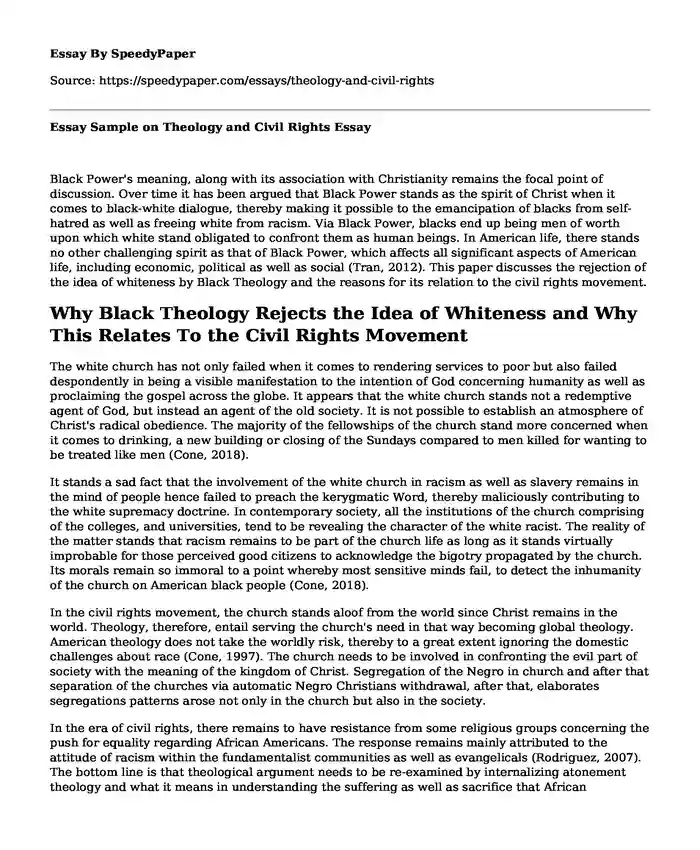
| Type of paper: | Course work |
| Categories: | Race Christianity Church Civil rights |
| Pages: | 3 |
| Wordcount: | 672 words |
Black Power's meaning, along with its association with Christianity remains the focal point of discussion. Over time it has been argued that Black Power stands as the spirit of Christ when it comes to black-white dialogue, thereby making it possible to the emancipation of blacks from self-hatred as well as freeing white from racism. Via Black Power, blacks end up being men of worth upon which white stand obligated to confront them as human beings. In American life, there stands no other challenging spirit as that of Black Power, which affects all significant aspects of American life, including economic, political as well as social (Tran, 2012). This paper discusses the rejection of the idea of whiteness by Black Theology and the reasons for its relation to the civil rights movement.
Why Black Theology Rejects the Idea of Whiteness and Why This Relates To the Civil Rights Movement
The white church has not only failed when it comes to rendering services to poor but also failed despondently in being a visible manifestation to the intention of God concerning humanity as well as proclaiming the gospel across the globe. It appears that the white church stands not a redemptive agent of God, but instead an agent of the old society. It is not possible to establish an atmosphere of Christ's radical obedience. The majority of the fellowships of the church stand more concerned when it comes to drinking, a new building or closing of the Sundays compared to men killed for wanting to be treated like men (Cone, 2018).
It stands a sad fact that the involvement of the white church in racism as well as slavery remains in the mind of people hence failed to preach the kerygmatic Word, thereby maliciously contributing to the white supremacy doctrine. In contemporary society, all the institutions of the church comprising of the colleges, and universities, tend to be revealing the character of the white racist. The reality of the matter stands that racism remains to be part of the church life as long as it stands virtually improbable for those perceived good citizens to acknowledge the bigotry propagated by the church. Its morals remain so immoral to a point whereby most sensitive minds fail, to detect the inhumanity of the church on American black people (Cone, 2018).
In the civil rights movement, the church stands aloof from the world since Christ remains in the world. Theology, therefore, entail serving the church's need in that way becoming global theology. American theology does not take the worldly risk, thereby to a great extent ignoring the domestic challenges about race (Cone, 1997). The church needs to be involved in confronting the evil part of society with the meaning of the kingdom of Christ. Segregation of the Negro in church and after that separation of the churches via automatic Negro Christians withdrawal, after that, elaborates segregations patterns arose not only in the church but also in the society.
In the era of civil rights, there remains to have resistance from some religious groups concerning the push for equality regarding African Americans. The response remains mainly attributed to the attitude of racism within the fundamentalist communities as well as evangelicals (Rodriguez, 2007). The bottom line is that theological argument needs to be re-examined by internalizing atonement theology and what it means in understanding the suffering as well as sacrifice that African Americans experienced.
Conclusion
Theology, to a great extent, has been an intellectual game not related to the issues of life and death. Thus, it stands impossible to creatively respond to life-situational challenges of unwanted and disinherited in society. Theology needs a revolution that radically confronts the challenges of disinheriting black people in the community, along with oppressed people of color in the entire world.
References
Cone, J. (2018). Black theology and black power. Orbis Books.
Cone, J. H. (1997). God of the Oppressed. Orbis Books.
Rodriguez, J. P. (2007). Slavery in the United States: A social, political, and historical encyclopedia (Vol. 1). Abc-clio.
Tran, J. (2012). The new Black theology: Retrieving ancient sources to challenge racism. The Christian Century, 129, 24-27.
Cite this page
Essay Sample on Theology and Civil Rights. (2023, Apr 10). Retrieved from https://speedypaper.net/essays/theology-and-civil-rights
Request Removal
If you are the original author of this essay and no longer wish to have it published on the SpeedyPaper website, please click below to request its removal:
- Bank Teller Cover Letter - Free Essay Sample for You
- Free Essay Sample on Spiritual Wellness
- Essay Sample Answering How to Study Effectively
- Psychology Essay Example: A View on Psychological Problems
- Free Essay: Ethical and Legal Issues in Provision Healthcare Services for Children
- Free Essay: Bush's Cooperation Between the Legislative and Executive Branches
- Essay Sample: Higher Education Opportunities and Advancements for Alaska Native Women
Popular categories




